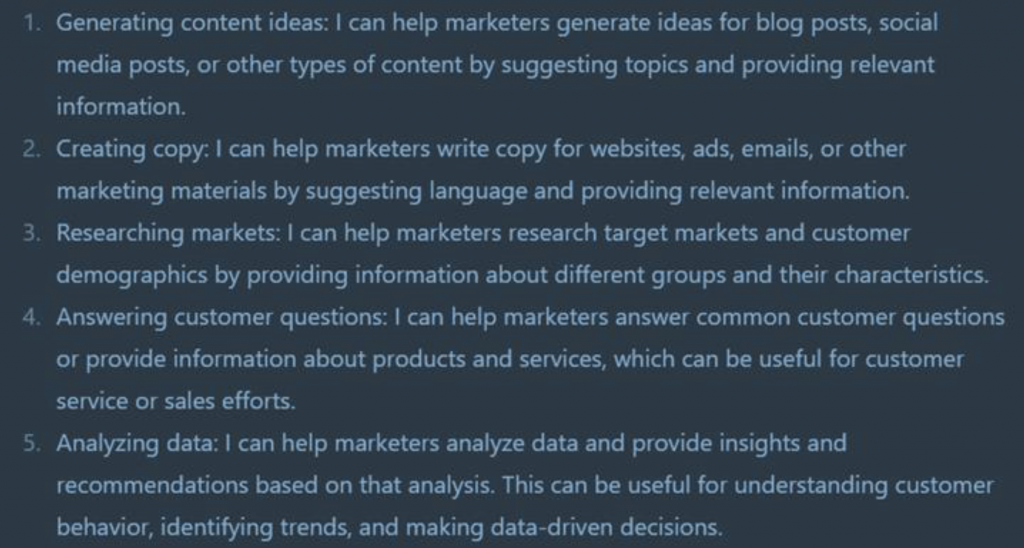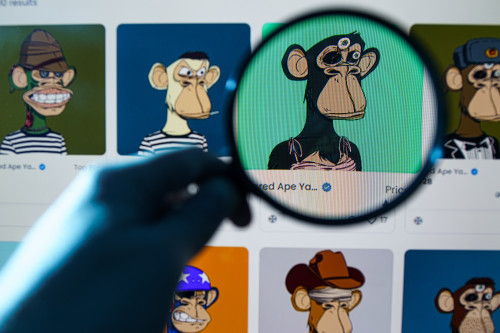As conversations around NFTs continue to escalate, so does confusion, but growth rates suggest it's time for brands to seek clarity.
Web 2.AI: Unpacking the Latest in Artificial Intelligence + Implications for Advertisers
Implications For Advertisers
We asked ChatGPT how it thinks it can help advertisers:

- Web 2.0 as we know it today will continue to be infused with and enhanced by AI. This will alter how users are interacting with existing platforms as well as shift users to new platforms. Advertisers will need to be ready to adjust
- AI is already capable of helping advertisers with various elements of their activations and optimizations. Some examples: SEO keyword research, coding, content writing, creative development, website development and creative analysis.
- Search behavior could see a significant shift to conversational search as chatbots are capable of understanding users speaking in a natural conversational manner. This could bypass the need to go to multiple sites/search results. Image search could also shift to AI-generated images to get the exact result a user is looking for vs searching and seeing if it already exists online.
- The current tools available to advertisers are by no means flawless and have many concerning elements that will need to be worked through over time. Examples: Deep-fakes, spam bots, false information, unknown biases, copyright infringement and ethics. Laws will need to be developed and adjusted over time.
- AI is developing at a rapid pace and advertisers need to remain flexible to stay ahead.
Web 2.0 Infused With & Enhanced By AI: Web 2.A
We have already been living in a Web 2.AI, whether we know it or not. AI is in use in the background of many applications, but it is stepping more into the foreground. For example, AI phone operators and AI chatbots on websites are in use by businesses of all sizes. We believe that we are now at an inflection point — AI has the ability to change the way we interact with the Web. This will have a significant impact on advertisers today and in the near future.
Read on for more, or click the ‘Download PDF’ button to the right to view our full POV.
Generative AI: High Quality, Low Effort Content
While there is still a need to review and edit the results, writing organic website and social content is easier than ever. Teams can use AI to conduct keyword research to guide content creation and even develop marketing materials such as guides and informational packets.
Advertisers should take advantage of these low-cost content building solutions to increase their reach, impact and frequency of content.
Free, On-Demand Copywriters & Artists At Your Disposal
Language AI is used to generate copy text and visual/audio AI is used to generate imagery, audio and/or video. Advertisers can upload all relevant brand information, goals, fonts, logos, and historical ads. AI can create net new creative concepts or re-stitch existing assets to create new creative.
The market is fragmented and costs vary widely from partner to partner. As the technology becomes more accessible, we expect costs to stabilize at a lower range and for this technology to integrate with existing advertising platforms. Advertisers can use this technology to rapidly scale creative concepts, increase ad iterations for testing, and create custom assets for specific activations.

Future State Of Search
Changing User Preferences
TikTok has gained a share of searches that historically have been conducted in search engines like Google and Bing. Some users have shown a new preference for user-generated short-form video content to inform their decisions. At Horizon, we believe that the development of AI can also have a significant impact on users’ search behavior and preferences over the coming months/years.
Answer Engines: Higher Quality Results With Less Searching?
AI could impact total searches and site clicks as users’ intent is better understood and more accurate results are given the first search without needing to click through to a landing page. More specifically, we may see the reduction of many commerce-based searches as concierge-like user bots can determine the best vendor and price point to buy products. With SEM broad match, there is the potential to unlock SEM coverage on conversational AI-specific search variants if AI becomes similarly monetized.
SEO content optimization will have to shift to focus on optimization for generative AI. Image/Video searches could shift from searching to see if the content already exists, to searching for AI-generated content based on exactly what the user is searching for. For example, this would impact sites that house libraries of stock images/videos.
What We Do Know
- AI is going to continue to move from the background to the foreground of digital experiences.
- Millions of users are quickly testing the limits of the latest AI releases and are eager to find ways to best utilize this technology.
- There are many AI-based tools at advertisers’ disposal today that can have a big impact on driving forward performance.
- Search engines are in an arms-race to incorporate generative AI into their platforms which can lead to some turbulence in terms of SEM/SEO analytics and SEM volume as these tools become monetized over time.
What We Don’t Know
- How quickly will AI continue to advance?
- Which AI will gain the most adoption?
- How will AI change users’ online behavior?
- What will domestic and international laws be?
What we’re doing
Unfortunately for humans, slow and steady doesn’t win this race. There are obvious advantages to leveraging AI to conduct more advanced analysis in a more rapid fashion. Here are some examples of how we are utilizing this at Horizon:
- Horizon’s Decanter Team is using AI to break down ads into thousands of meta-data elements that can then be analyzed in a cross-channel analysis. Sample meta-data elements include product open package vs closed, features person of x age range, offer type, and object identification. The AI can even be taught to look for advertiser-specific elements such as specific products and/or branding recognition. AI is also being used to create and score ads.
- Horizon’s Night Market team is using predictive analytics to make investment decisions across retailers with “Neon.” Neon’s computing power forecasts to the tactical level and optimizes in-market spend in real time at the SKU level.
- Other Horizon teams are using AI for faster, improved and customized coding, bid algorithms and scripts to advance campaign optimization and analytics.
Advertisers should be looking to AI for deeper insights and data-driven decisions. Use it for pre-launch predictive analyses, in-flight real-time analyses, and/or post-campaign analyses.
Horizon can help identify & create customized solutions with AI partners in our partner network to enable advertisers to leverage AI for their specific needs. Please reach out to: Web2AI@horizonmedia.com to learn more.
Click the ‘Download PDF’ button below for the full POV.




